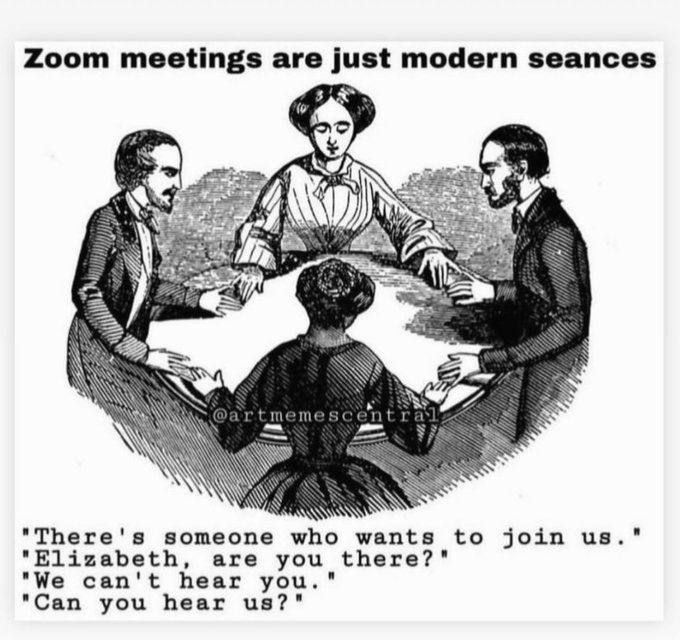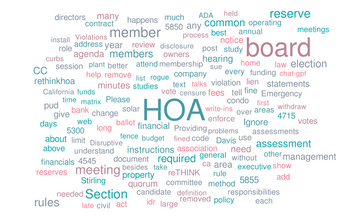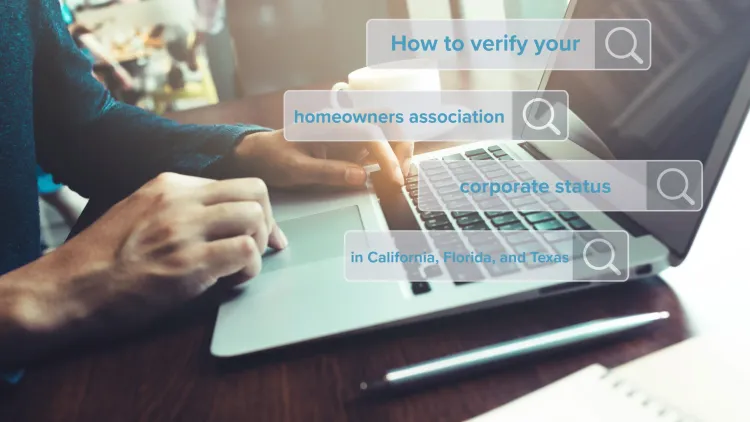For many, Homeowners Association (HOA) meetings have long been a staple of community life. But the usual face-to-face gatherings took a back seat when the pandemic hit as virtual meetings stepped into the spotlight. As we move to a post-pandemic world, it's worth asking: Are virtual HOA meetings here to stay?

- The pandemic catalyzed the shift from in-person to virtual HOA meetings, providing benefits such as increased attendance and inclusivity, cost reductions, convenience, and safety. However, this transition also faced challenges, including technical difficulties, reduced personal engagement, security concerns, and legal restrictions.
- Many states have updated their legislation to allow virtual HOA meetings in response to the pandemic and changing homeowner preferences. However, the legal landscapes vary across different states, necessitating HOAs to review their bylaws and governing documents and to seek legal counsel as needed. The article summarizes the current HOA laws regarding remote meetings in California, Florida, and Texas.
- Virtual HOA meetings will continue to be a viable option post-pandemic due to their convenience and technological advancement. While balancing legislative nuances, a hybrid model accommodating in-person and virtual attendance could become the norm. For effective virtual meetings, the article recommends using secure, accessible platforms, encouraging participation, ensuring privacy, and staying compliant with the regulations.
What is an HOA?
Before diving into the crux of the matter, let's quickly define an HOA. HOAs are organizations in residential communities that make and enforce rules for properties within their jurisdiction. Regular meetings are essential to HOA management; they foster community engagement, address homeowner concerns, and ensure transparent communication and collective decision-making. For an in-depth understanding, check out our previous article: "What is a Homeowners Association (HOA) and How Does it Work? An Overview for Homeowners".
The Rise of Virtual HOA Meetings
Before the COVID-19 pandemic, HOAs conducted meetings exclusively in person. The health crisis necessitated a rapid shift in how we gather, forcing many HOAs to adapt by moving their meetings online. This shift brought with it several benefits:
- Increased attendance and inclusivity: The convenience of remote attendance can lead to higher participation rates, as those with schedule conflicts or mobility issues can still attend from the comfort of their homes.
- Reduced costs: Virtual meetings eliminated the need for physical spaces, refreshments, and other amenities.
- Convenience and accessibility: Residents could participate regardless of their location.
- Safety: At the height of the pandemic, virtual meetings provided a safe alternative to gathering in person.
Challenges of Virtual HOA Meetings
Though essential, this shift to virtual meetings was challenging. There were hurdles to overcome, such as:
- Technical difficulties and digital divide: Not everyone was tech-savvy or had access to reliable internet.
- Less personal engagement: Virtual meetings sometimes lack the personal touch that face-to-face interactions provide.
- Security and privacy concerns: There were concerns over the security of online platforms.
- Legal restrictions and requirements: Most HOA regulations were initially designed with in-person meetings in mind, and virtual meetings presented a new territory often at odds with existing laws.
The Current Landscape and Trends
Numerous states have updated their legislation to accommodate virtual HOA meetings, reacting to changes in circumstances and homeowner inclinations. These modifications vary from provisional permissions to more enduring changes that could redefine the functioning of HOAs.
Considering the diverse legal contexts across various states, HOAs should carefully review their bylaws and governing documents while keeping abreast of alterations in laws and regulations. Additionally, obtaining appropriate legal advice when needed is pivotal to ensuring adherence to rules and effective governance. Let's delve into some of the disparities in HOA laws regarding remote meetings in states such as California, Florida, and Texas.
California

The Davis-Stirling Common Interest Development Act is the primary body of California law governing condominiums, planned developments, and other common interest developments. The Open Meeting Act[1] does not allow fully remote meetings; HOAs must also specify a physical location. Due to the COVID-19 pandemic, temporary executive orders and emergency legislation modified some of the requirements for HOA meetings, including allowing for fully remote meetings without a physical location[2]. The Act does allow for hybrid board meetings to be conducted via teleconference under certain conditions[3]:
- Physical Location: Notices of board meetings conducted via teleconference must identify at least one physical location where members can attend and state that the meeting will be conducted via teleconference.
- Representative Present: At least one director or a person designated by the board must be present at the physical location.
- Accessibility: The teleconference meeting must be accessible to all members. Directors and members must be able to hear one another.
Florida

The state of emergency in Florida expired on June 26, 2021. As a result, the "emergency powers" given to condominiums, coops, and homeowners associations in the Florida Statutes Section 718.1265[4] (condos), 719.128[5] (coops), and 720.316[6] (HOAs) are no longer in effect. The emergency powers statutes, amended effective July 12, 2021, specifically provide that during a declared state of emergency, the association may conduct board meetings, committee meetings, elections, and membership meetings, in whole or in part, by telephone, real-time videoconferencing, or similar real-time electronic or video communications.
After the expiration of the state of emergency, the issue of remote meetings became more complex. The Florida Statutes provide that board meetings must be open to all owners and that owners can participate remotely in the same manner as board members[7]. However, there is ambiguity regarding the validity of remote-only meetings. Additionally, regarding owner meetings and elections, the statutes require certain conditions to be met for remote voting. Because of these legal issues, a hybrid approach is recommended in Florida, allowing in-person and remote participation.
Texas

Texas' response to the pandemic saw a temporary relaxation of certain regulations to facilitate the continuity of HOA operations via virtual meetings. The state recognized the importance of enabling HOAs to continue functioning while prioritizing the safety and health of community members.
Texas laws generally require HOAs to hold open meetings, but during the pandemic, there was a temporary shift to allow for virtual meetings as specified in Texas Government Code Section 551.127[8]. On September 1, 2021, all open meeting requirements resumed for HOAs. Following the pandemic, Texas HOAs have considered the advantages of maintaining virtual meetings or adopting a hybrid model.
The Texas Property Code was updated to address the use of virtual meetings by HOAs specifically. It provides that unless the association's governing documents specifically require meetings to be held in person, an HOA board meeting can be held by teleconference or videoconference. For a meeting to be considered a teleconference or videoconference meeting under the Property Code, the meeting must be accessible to the association members in a way that they can participate and vote on matters before the board. Members must be able to hear and be heard by all other participants.
Predictions for the Future
Many experts believe virtual meetings will likely remain a viable option for many HOAs. The convenience factor and continued improvement in technology make them an attractive choice. Additionally, as legal frameworks adapt, virtual and hybrid models are expected to gain even more traction.
Tips for Successful Virtual HOA Meetings
If your HOA is considering continuing with virtual meetings, here are a few tips:
- Choose one of the readily available, home-accessible virtual meeting platforms: Make sure it's secure and accommodates the size of your community. Look for features such as sharing slideshows, muting, and polling. Popular options include Zoom, Google Meet, Microsoft Teams.
- Request members who need assistance with virtual attendance to provide advance notice.
- For those members who are physically present, set up a dedicated computer and speakerphone to allow everyone to hear and interact with each other. Some speakerphone options include: eMeet Luna or Anker PowerConf.
- Encourage participation and engagement: Use interactive features like polls and Q&A sessions. For a comprehensive guide on conducting effective meetings, refer to "How to Run an Effective HOA Board Meeting: A Step-by-Step Guide with a Free Agenda Template & Reference Sheet" and learn "How to Take HOA Meeting Minutes: A Step-by-Step Guide with a Free Template."
- Ensure security and privacy: Be aware of privacy policies and handle data properly.
- Stay compliant with legal requirements: Keep abreast of laws and regulations regarding virtual meetings.
Final Thoughts
As we navigate the post-pandemic landscape, the prospect of virtual HOA meetings continuing to play a significant role in community management is increasingly likely. The benefits they provide, such as increased accessibility, reduced costs, and ongoing technological advancements, make a compelling case for their permanence.
However, HOAs must balance the convenience and efficiency of virtual meetings with the legislative nuances of different states and their governing documents. A mixed or hybrid model, where in-person and virtual attendance are accommodated, could emerge as the ideal solution, harmonizing the need for safety, inclusivity, cost-effectiveness, and legal compliance.
As we venture into this new era, HOAs must stay updated with the latest laws and technologies to ensure effective and compliant operations. Your experiences and thoughts on this matter are valuable. We invite you to share your experiences and insights about virtual HOA meetings.
Footnotes & References
- California Legislative Information. Article 2. Board Meeting [4900-4955] aka "Common Interest Development Open Meeting Act".
- California Legislative Information. Article 11. Emergency Powers and Procedures [5450].
- California Legislative Information. Article 2. Board Meeting [4925].
- The Florida Statutes (including 2022 Special Session A and 2023 Special Session B). Chapter 718.1265 Condominiums. Association emergency powers.
- The Florida Statutes (including 2022 Special Session A and 2023 Special Session B). Chapter 719.128 Cooperatives. Association emergency powers.
- The Florida Statutes (including 2022 Special Session A and 2023 Special Session B). Chapter 720.316 Homeowners' Association. Association emergency powers.
- The Attorney General of Texas. Conducting Virtual Meetings During the COVID-19 Emergency.
- Texas Government Code. Title 5. Open Government; Ethics. Subtitle A. Open Government. Chapter 551. Open Meetings. Subchapter A. General Provisions.






